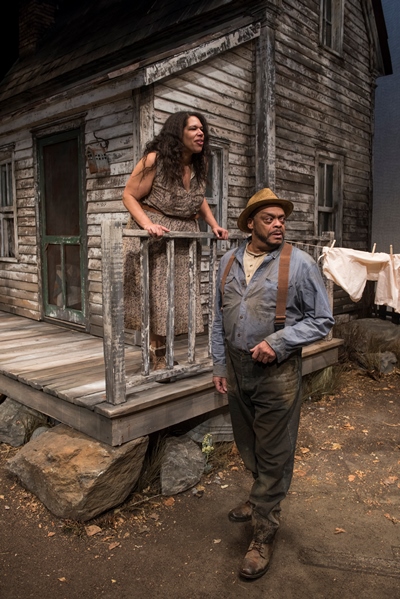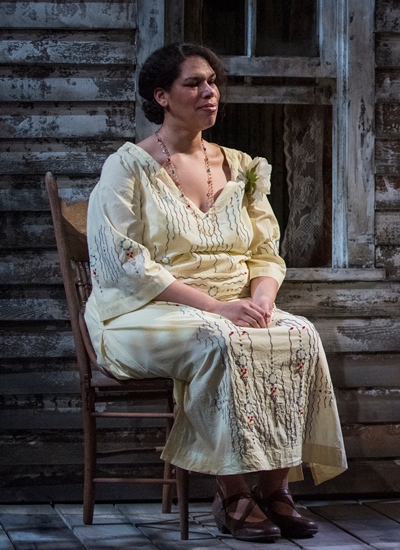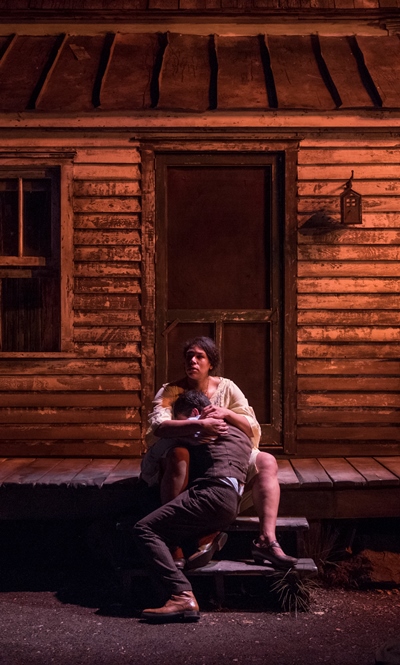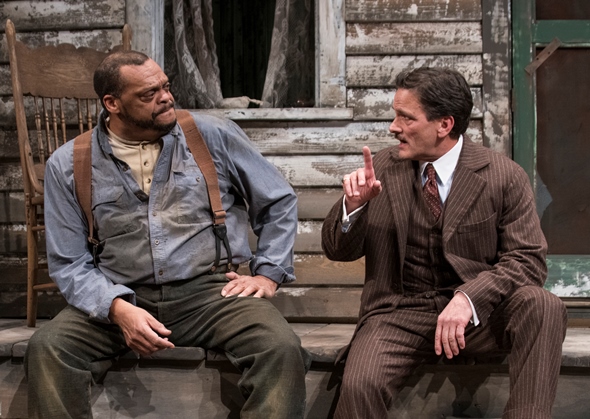‘A Moon for the Misbegotten’ at Writers: Grasping for some truth beneath a pall of lies
Review: “A Moon for the Misbegotten” by Eugene O’Neill, at Writers Theatre through March 18. ★★★★
By Lawrence B. Johnson
Brawny Phil Hogan and his imposing, hard-as-nails daughter Josie are poor tenant farmers in 1920s Connecticut. James Tyrone Jr., who owns the farm, is a wealthy playboy who’s always had a soft spot for Josie – and for booze and, by loud proclamation, for the tarts on Broadway.
The daily bread of them all, these desperate occupants of Eugene O’Neill’s “A Moon for the Misbegotten,” is mendacity. They lie to each other and they lie to themselves, until they each find some part of redemption in some measure of truth. Their rough progress toward that grail is a magical thing to witness at Writers Theatre in an earthy, soulful production directed by William Brown.
 Designer Todd Rosenthal’s weathered old house commands the eye before an actor enters the scene. When the blustery farmer and his untamed daughter, the one as shabby and grimy as the other, compound the impression, a sense of fundamental privation locks in. These folks are as poor as their peeling shack suggests, living by their backs and wiles, with no prospects beyond another day of labor in the field and meager reward for it.
Designer Todd Rosenthal’s weathered old house commands the eye before an actor enters the scene. When the blustery farmer and his untamed daughter, the one as shabby and grimy as the other, compound the impression, a sense of fundamental privation locks in. These folks are as poor as their peeling shack suggests, living by their backs and wiles, with no prospects beyond another day of labor in the field and meager reward for it.
They’re a pair of hell-raisers, too – A.C. Smith’s Hogan, endlessly roaring and threatening, and Bethany Thomas’ defiant Josie. But amid all their hollering and name-calling, dad and daughter can also flash a volatile sense of humor. These two understand each other.
If Hogan and Josie’s sparring is constant, and usually heated, their antagonism is framed by the realization that they’re in this together. Their fighting is like deep, sustaining breaths taken as they pull under the same yoke. And when Hogan shows real temper and gets in Josie’s face, it is not this big-boned girl – this “cow,” as Hogan calls her – who backs down. Ever.
Josie does have her weakness: a reputation for accommodating most of the men and boys in communities for miles around. Everybody talks about it, and Hogan berates her with those shameful rumors. Josie doesn’t deny anything. The guys in town all tell each other lurid stories. What’s left for her to say?
 Yet the time may have come when Josie’s easy ways could be useful. Lately, Hogan and his daughter have caught hints that they could be dispossessed. Rumor has it that Jim Tyrone has been offered a good price for the decrepit farm and that the deal is all but settled. Maybe Josie could cozy up to Jim. He’s always liked her.
Yet the time may have come when Josie’s easy ways could be useful. Lately, Hogan and his daughter have caught hints that they could be dispossessed. Rumor has it that Jim Tyrone has been offered a good price for the decrepit farm and that the deal is all but settled. Maybe Josie could cozy up to Jim. He’s always liked her.
If they play their cards right, father and daughter could both come out sitting pretty. Smith’s Hogan, a growly old bear who at any moment can rear up into a wry grin, makes a persuasive case for this urgent action.
When Jim (Jim DeVita in a performance of studied precision and mortal agony) pays a brief visit to the Hogans, Josie encourages him to come by later that night, and he accepts. Act II of “A Moon for the Misbegotten” is all about the moon – and the solitary figure of Josie beneath it.
This critical turn in the play also brought more persuasive acting from Thomas, whose expository effort to show Josie’s hardness, not to say self-loathing, bordered on monotonous and mechanical. With the moonlit second act, all that disappeared as Thomas revealed the complicated, vulnerable, authentic woman beneath the grime, the abrasiveness and the posturing.
Poised on the front porch chair in a fresh yellow dress and necklace, a flower on her shoulder and her hair neatly coiffed, Josie looks beautiful. Then she waits. And waits. And waits. Until her heart and pride crack together under that wait. Finally, Jim shows. But it’s not exactly romance on his mind. He has come for confession, perhaps absolution, and certainly for truth.
 The long moonlight scene between DaVita’s agitated alcoholic, now doggedly sober-minded, and Thomas’ receptive, embracing, wholly loving Josie took the show to a special place.
The long moonlight scene between DaVita’s agitated alcoholic, now doggedly sober-minded, and Thomas’ receptive, embracing, wholly loving Josie took the show to a special place.
This will not be a night for the well-rehearsed old lies; Jim is determined on that score. Not Josie’s, not – his. He doesn’t want to hear that bunk about his Broadway tarts. He has not come to forget himself in that way – to be with Josie in that way. He is weary in his soul. Josie is the one person in the world whose honesty he trusts, whose goodness he believes in.
DaVita delivered Jim’s purgative monologue with an incision that cut to the heart, to the core place of perfect truth. When this reeling man had said it all, or all that he could possibly allow himself even to this radiant confessor, he collapsed into the bosom of seated Josie, his Madonna of pietà.
In the end, Josie offers the spiritually broken man an ironic benediction. By that point, Thomas’ transfigured woman had the play and the moment so firmly in her grasp that one could only respond in silence: Amen.
Related Link:
- Performance location, dates and times: Details at TheatreInChicago.com
Tags: A Moon for the Misbegotten, A.C. Smith, Bethany Thomas, Eugene O'Neill, Jim DeVita, Rachel Anne Healy, Todd Rosenthal, William Brown, Writers' Theatre


